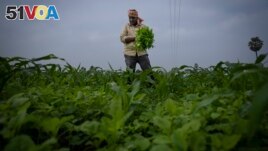13 April 2024
There is a strong smell that comes off Ratna Raju's farm in the southern Andhra Pradesh state of India. The smell comes from a mixture of natural materials, like cow urine and unrefined sugar.
Raju says the natural materials help grow and protect crops in an area often hit by extreme weather and heat.
Farmers like Raju say natural materials protect their crops from climate change because the soil can hold more water. And they say the crops' stronger roots help plants deal with strong winds.

Ratna Raju a farmer who is part of a collective who practice natural farming, harvests spinach at his farm in Pedavuppudu village, Guntur district of southern India's Andhra Pradesh state, Monday, Feb. 12, 2024. (AP Photo/Altaf Qadri)
Supporters say natural farming is successful in the state because of government support. Now, they say these methods should be expanded across India's agricultural lands. They point to climate change and decreasing profits that have led to several farmers' protests this year.
Without government support for natural farming, most Indian farmers still use chemical pesticides and fertilizers. That puts them at risk when extreme weather hits. Many farmers are calling for greater federal and state investment to help them deal with climate change.
Raju has seen the gains of using natural methods.
Last December, a storm called Cyclone Michaung brought heavy rainfall across India's southeastern coast. It flooded towns and fields. Early studies showed more than 240,000 hectares of crops were destroyed in Andhra Pradesh state.
Raju said, "the rainwater on our farms seeped into the ground in one day." The soil can take in more water because it is less dense than soil with pesticide. Soil with pesticide is dry. He added that planting different crops throughout the year helps keep the soil healthy.
But his neighbor Srikanth Kanapala's farm was flooded for four days after the storm. Kanapala uses chemical pesticides and fertilizers on his farm. And he said after seeing Raju's crops hold strong while his failed made him want to learn about other farming methods.
Kanapala estimates that he lost up to $600 because of the storm, a sizeable amount for a small farmer in India. "For the next planting season, I plan to use natural farming methods too," he said.
Rythu Sadhikara Samstha is a government-backed organization launched in 2016 to support natural farming. It found that government support has resulted in an estimated 700,000 farmers changing to natural methods in Andhra Pradesh. And the state hopes that all of its six million farmers will use natural farming by the end of 2030.
Meerabi Chunduru is one of the first in the area to start using natural farming. She said she changed to the methods after her husband's health worsened. She believes his health worsened because of extended exposure to harmful pesticides.
Health effects of different pesticides have not been studied in detail. But farmers around the world have long claimed extended exposure has caused health problems.
In India, 63 farmers died in the western state of Maharashtra in 2017. It is believed to be linked to a pesticide containing the chemical Diafenthiuron. It is currently banned in the European Union, but not in India.
Natural farming supporters say many officials still trust farming methods that use chemical fertilizers and pesticides to produce the most crops. This year, the Indian government has set $20 billion in fertilizer financial support. But it only set aside $55 million for natural farming.
Chunduru hopes that will change. She said, with natural farming, "we can provide nutrient-rich food, soil and physical health" to future generations.
I'm Gregory Stachel.
Shawn Sebastian and Sibi Arasu reported this story for The Associated Press. Gregory Stachel adapted it for VOA Learning English.
______
Words in This Story
urine – n. the waste liquid that collects in the bladder and that you pass from your body
pesticide – n. a chemical that is used to kill animals or insects that damage plants or crops
seep – v. to flow or pass slowly through small openings in something
exposure – n. the fact or condition of being affected by something or experiencing something










